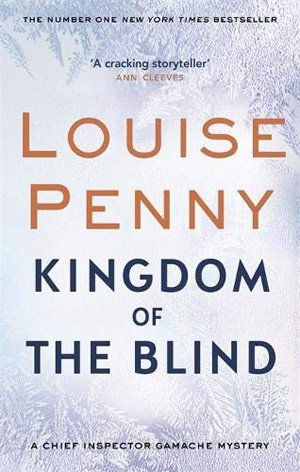
Written by Louise Penny — In a rather moving afterword to the book, Louise Penny admits that she thought she was done with her beloved creation, Armand Gamache, former head of the Sûreté du Québec. The author says that for a long time after her husband’s death she felt unable to revisit this thoughtful, calm and uxorious character, who had been partly inspired by him.
Yet in the end, much to the delight of Louise Penny’s loyal readers, the words did flow. This latest mystery is the 14th in the series centred around Gamache and the village of Three Pines in Quebec, and at first it does not seem to have murder at its core at all.
Just as snow is starting to cover the roads, Gamache is driving to an old house that he has never seen before. To his surprise, he discovers that he has been named executor to the estate of an old lady that he’s never heard of, together with Myrna, the bookseller from Three Pines, and a young builder unknown to either of them named Benedict. Why would this apparent stranger choose them, especially when there doesn’t seem to be any actual inheritance involved?
The old woman seems to have been convinced that she was cheated out of a great fortune during the rise of the Nazis in Vienna. So Gamache and the other executors take on the thankless task of checking out the claims and talking to the remaining family about their inheritance, which none of them seem to believe in. However, when a dead body is found in a collapsed house, the story of a missing inheritance starts to become more plausible. The plot is long and convoluted and involves family feuds and financial fraud.
As is the norm in this series, the second storyline involves the grim machinations of all of Gamache’s colleagues, keen on getting rid of him once and for all. At the start of the book, he has been suspended from the Sûreté after a huge drug consignment entered the country on his watch. Of course, he has a secret plan that no one else knows about, not even his son-in-law and current Acting Head of Homicide, Jean-Guy, and the latter’s loyalty will be sorely tested at times.
This second strand to the story does feel a little recycled – surely we have already seen all the possible permutations of blame and recrimination, set-ups and conspiracies? Although the scenes involving homeless people and drug addicts in Montreal are well-written and menacing, the danger surrounding Gamache himself no longer feels so immediate and visceral. After all, he has retired to the village of Three Pines and has only temporarily come out of retirement to train new cadets at the police academy. He could easily spend the rest of his days contentedly pottering around with his dogs.
What readers love most about the series, of course, is the charming village setting, and its population of opinionated, mostly good-tempered eccentrics. A return to Three Pines is always like enjoying a good meal and a drink or two in the company of dear old friends. True, there are times when it feels like we’ve heard all of their opinions and jokes before, that they have not moved on but are obstinately sticking to their old clichés. Yet we wouldn’t like to be without them. Besides, the description of snowstorms and power cuts of a Canadian winter make you feel very lucky indeed to be sitting inside reading.
Louise Penny is certainly a very gifted writer, clever at juxtaposing a cosy atmosphere with the darkness and unknowability of the human heart. After all the pleasure that she has given us over the years with Armand Gamache, after all her hard work to push the boundaries of crime fiction as far as they will go, it feels a little disloyal to say that maybe it is time to move on to another setting and a new set of characters. I would certainly recommend reading this series, but my advice would be not to start with this book. This novel is more for the hardcore fans.
Also see our review of Louise Penny’s The Beautiful Mystery, or try the Toronto-based novel Bellevue Square by Michael Redhill.
Sphere
Print/Kindle/iBook
£9.99
CFL Rating: 3 Stars









